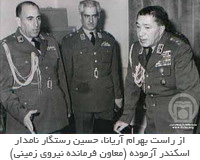General Eskandar Azmoodeh, son of Mahmoud, was born in Tehran in 1912. He continued his education in the army secondary school1 and the military academy and joined the army in 19332. In 1945 he was First Battalion, Sixth Infantry Regiment ...
General Eskandar Azmoodeh, son of Mahmoud, was born in Tehran in 1912. He continued his education in the army secondary school1 and the military academy and joined the army in 19332. In 1945 he was First Battalion, Sixth Infantry Regiment Captain when he was sent to Azerbaijan to fight craft army.3 In 1953 during the conspiracy to overthrow Dr. Mosadegh’s government, Azmoodeh was lieutenant colonel infantry and Pahlavi regimental commander and he accepted colonel Nasiri’s invitation to participate in the coup against the government.4 He made contact with the coup’s agents and in a meeting with Zahedi promised to be faithful and help.5 one of his actions was holding night sessions to justify the officers and encourage them to participate in the coup.6Colonel Azmoodeh assigned 4 missions to his group in this operation which includes: 1- arrest of colonel Momtaz, Jamshid Abad’s regimental commander and officer in charge of protecting the prime minister’s house; 2- positioning of part of his forces near Dr. Mosadegh’s house so that in case any kind of resistance occurred on the part of his protectors, these forces would strengthen the guards; 3- arrest of brigadier Riahi, head of army general staff; 4- disconnecting the Bazaar central telecommunications.7 on the night of august 15 1953, he ordered the start of the operation8 and at midnight when he realized telecommunications is still not disconnected, he went there himself with two trucks of soldiers and forced the attendant in charge to disconnect the communication at gun point.9he then headed towards Kakh street to continue the operation when he found out about the coup’s failure and returned on to the telecommunications center again on the morning of 16th and ordered reconnection of telecommunications. To avoid being arrested like the other coup leaders, Azmoodeh returned to the governor’s office and requested a traffic pass but his arrest warrant was issued by the army general staff and his interrogations began.10
One day after the victory of the coup’s leaders on August 20th, Azmoodeh was released and took control of commandership of first mountain brigade and first armored brigade and acted on arresting officers faithful to Dr. Mosadegh’s government.11 after Mohammad Reza Pahlavi returned to the country, Azmoodeh was promoted to colonel and awarded grade 1 resurrection medal. He also was a member of the special commission to investigate the status of officers in the August 19th coup de ta. The responsibility of this commission was to identify the officers who helped the coup and request their promotion.12 After the coup and the arrest of Dr. Mosadegh; the responsibility of his protection in Saltanat Abad was with the Pahlavi regiment and colonel Azmoodeh, the commander of this regiment.
After a while, Azmoodeh became Iran’s deputy military representative in England and at the same time started learning the tactics military course.13 He was awaiting a great reward and in 1957 wrote a letter to Ardeshir Zahedi stating his dissatisfaction from not being promoted and asked him to mediate with the Shah in this regard.14 he returned after passing the missile course in the US and was appointed as the commander of Azerbaijan ad Fars armies with major general rank. In June 1963, as the commander of Tabriz army, by enforcing the “lion” plan and standby of all forces, he prevented any kind of movement in Tabriz and received a citation in this regard.15 in 1965, Azmoodeh was appointed as the logistic commander of the land forces.16 a while later he was promoted to generalship and army adjutant of the Shah. After retirement in 1968 he was assigned the deputyship of the department of finance and general administrator of customs by Jamshid Amoozgar, the finance minister of Hoveida’s government and he remained there until 1974. From January 1975 to 1978 he was the governor of east Azerbaijan. With the onset of the Islamic Revolution, Azerbaijan was also in a state of flurry as were other states and on February 18th 1978, the people of Tabriz wished to hold the 40th day ceremony for martyrs of Qom like the other cities in Iran but there were stopped by the governor and some were injured and killed in struggles with the government forces. Azmoodeh set martial curfew law in the city but peace did not return. So the Shah blamed him for the turbulence and he was dismissed from governorship on February 28th and summoned to Tehran. General Eskandar Azmoodeh left Iran and went to England after dismissal and died there in 1998.
https://iichs.ir/vdcd.o0f2yt05jme6y.html
iichs.ir/vdcd.o0f2yt05jme6y.html
